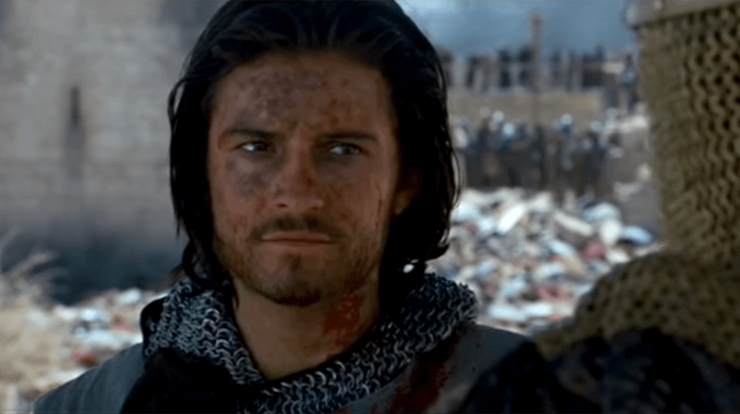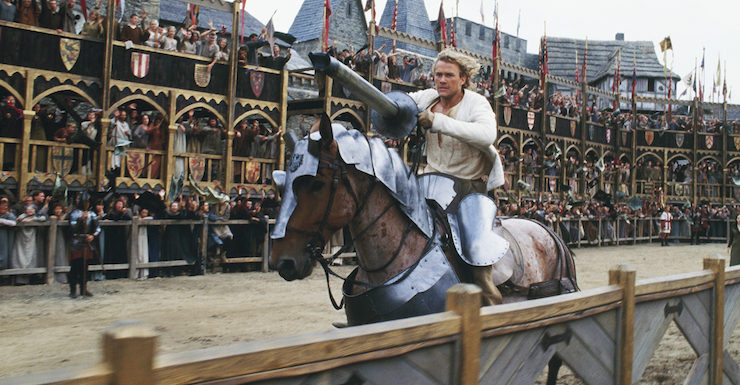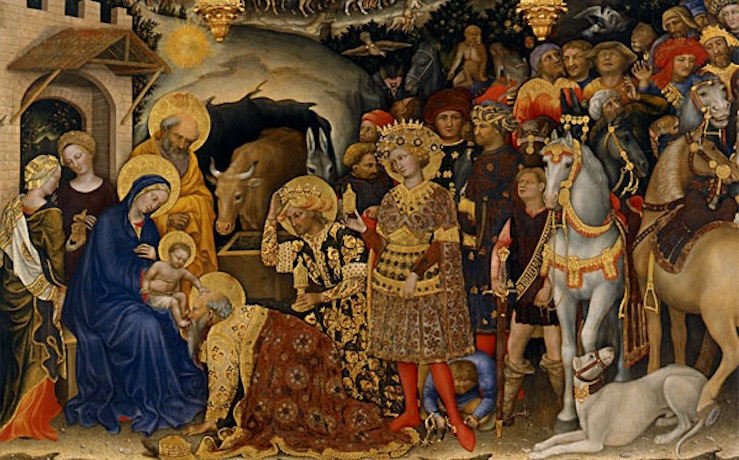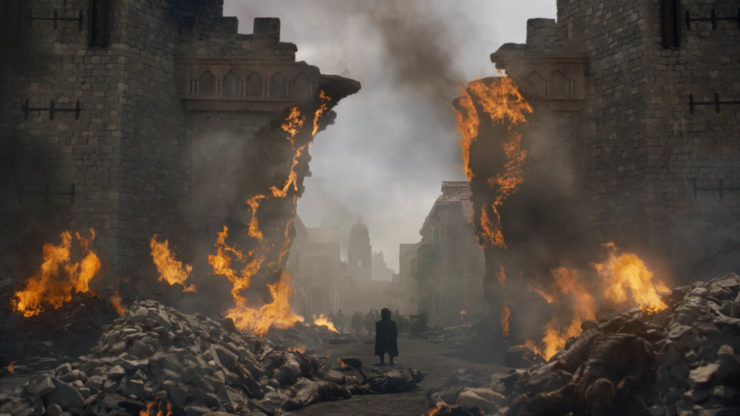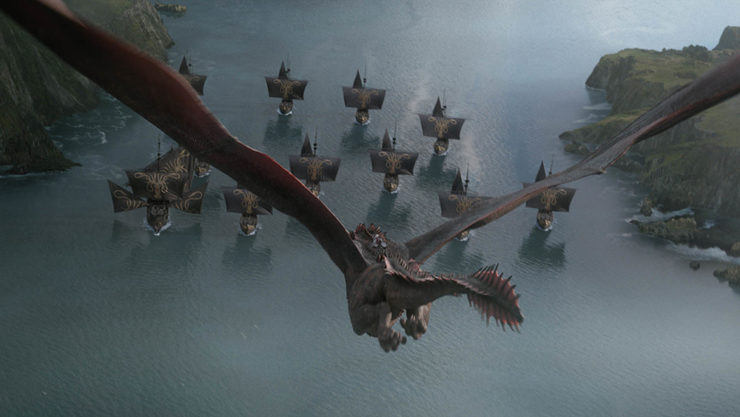In both my scholarship and my fiction, my mind has been on war of late.
I think that’s why I’ve decided to take a breather from my workloads by queuing up Ridley Scott’s Kingdom of Heaven: The Director’s Cut (2006).
First, I must tell you that I saw Kingdom of Heaven when it first came out in theaters in 2005. It was both disappointing and exhausting: the main arc of the protagonist made no sense, the pacing was odd, and the historical events were portrayed, well, super wrong. Also, and I must get this out of the way upfront, I’m not a fan of Orlando Bloom in this kind of role. I don’t know what Hollywood was thinking by casting him as a crusader knight. It’s especially odd when so much of the rest of the cast is perfection.
Anyway, I saw it in the theaters, was very much not impressed, and that was that.
But then you, my dear readers, in comments to previous Medieval Matters columns, asked me again and again to review Kingdom of Heaven: The Director’s Cut. It’s better, y’all insisted.
So fine. Let’s give this a shot. God wills it!
Somber music plays. It’s 1184. As our opening historical note says: “It is almost 100 years since Christian armies from Europe seized Jerusalem.”
Unlike that farce of an opening from Braveheart, we have no mistakes here so far! The First Crusade was called by Pope Urban II in 1095, and within a year lords from France, the Low Countries, and Norman-controlled Italy were assembled with the intent of wresting control of the Holy Land from the Muslims. They weren’t a very organized lot, but neither was their opposition. And luck—they would say the Lord God—was with them. In 1099, when they needed wood to construct siege towers and engines to take the walls of Jerusalem, for instance, Tancred (one of the Christian leaders) “miraculously” found some in a cave where he went to relieve himself privately as a result of a severe bout of dysentery. Anyway, they took Jerusalem, indiscriminately slaughtered untold numbers of human beings in the name of God, and more or less established a cycle of violence begetting violence that continues to this day.
All that to say that, yeah, 1184 is about 100 years after 1099. The math checks out.
The movie informs us that lots of folks are goin’ to the Holy Land, but one knight is actually coming home from there to see his son in France. The knight is Godfrey, the baron of Ibelin, a holding in the Holy Land. He’s played by Liam Neeson, who Neesons the heck out of his role.
The France that Godfrey passes into—the holding of his brother, we learn—is colorless and dismal. The people are cold, dirty, poor, and, outside of our forthcoming hero, not pretty at all.
This is one of our first clues that this film has an angle that will override historical accuracy: the filmmakers are working hard to depict Western Christendom as morally, intellectually, culturally, and spiritually backward.
So you can put away that book on the very real Twelfth Century Renaissance.
Meanwhile, amid all this gloom, looking quite Orlando Bloom-y, Orlando Bloom plays Balian, a blacksmith mourning his wife, who committed suicide after the death of their infant son. Balian’s brother (Michael Sheen) is the parish priest, and he’s the sort of man who hides his horrifying greed and thirst for power beneath the veil of religious fanaticism. In other words, he’s a total dick.
And here we get the root cause of almost every historical flaw in the film, including its decision to debase Western Christendom: its unceasing stance of attack against religious fervor.
I’ve heard rumors that Ridley Scott was planning to create a biopic of the enormously successful Muslim leader Saladin, and that the events of 9/11 pushed him to alter this vision into an epic centered on Balian of Ibelin, the man who defended Jerusalem against Saladin in 1187. I don’t know if this rumor is true, but it would make a great deal of sense: 9/11 haunts almost every frame of this film, which in the end argues that no one is free of sin, and that those who most fervently proclaim themselves the arbiters of God’s judgment on Earth—Christian and Muslim alike—bring death and destruction in their unceasing quest for power. This is a movie that tries to declare a pox on both their houses, while paradoxically holding up as its hero a scrawny Orlando Bloom who kills an enormous number of Christians and Muslims alike but that’s fine since, um, he’s a “pure” knight—so his heart is in the right place when he slashes a man’s life-blood across the camera lens.
Seems legit.
Anyway … where was I?
Oh, right, Balian’s brother the priest is a dick.
So along comes Godfrey, who confronts the sad-faced Bloom as the young fellow is working in his forge: “Word is your baby just died, and your wife committed suicide and your brother keeps sleazily whispering about how she’s in Hell now,” he says. “Thoughts and prayers.”
Balian-Bloom gloomily broods in his blooming silence.
“Right,” says Godfrey, doffing his woolen hoodie-cap. “Anyway, you’re also a literal bastard because I had sex with your mom, and while she didn’t say ‘no’ she couldn’t exactly say ‘yes’ since she was a blacksmith’s wife and I was her lord, which is a bit of an issue with consent. But, again, thoughts and prayers. Want to come to the Holy Land?”
Balian declines. Neeson takes off. Then Balian’s brother the priest is an even bigger dick and Balian rage-murders him.
So we’re off to Jerusalem with dear ol’ dad!
Ok. Pausing here to say y’all are right. Kingdom of Heaven: The Director’s Cut is definitely better than the theatrical version. Already I can see how there are pieces here and there—like a line about how Balian previously served as a soldier and an engineer and was praised for his siege works—that were missing from the original release and contributed to some of its nonsensical plot developments. So thanks, gang!
Back to the show …
Surprising no one at all, Godfrey’s wicked nephew—it’s pre-Jaime Lannister (Nikolaj Coster-Waldau), everybody!—attacks in order to (1) kill Balian for revenge, and (2) kill Godfrey for his lands.
What results is a bloody battle of swords and crossbows in which Godfrey takes a horrific bolt to the side but still manages to cleave the skull of his nephew. And Kevin McKidd, the man who will surely reprise his role as Lucius Vorenus when they make The Shards of Heaven into a film trilogy, goes far beyond his credited role as “English sergeant”: when one survivor asks to be ransomed, McKidd unceremoniously drives the spike of his warhammer into the top of the man’s skull.
Regarding this, I should like to note that I own that warhammer. It hangs in my office.
And, hey! That’s because it’s a decent replica of a 15th century warhammer!
Oh, right. This is supposed to be the 12th century. Yeah. That’s not good.
That said, I’m generally impressed with the accuracy of the arms and armor in this movie. Yeah, there are a few eyebrow-raisers, and yeah, the battle scenes suffer from the main characters continuously and inexplicably losing their helmets—sweet baby Jeebus, people, use the friggin’ buckles!—but what they’re wearing and swinging is more often than not spot-on excellent. Kudos!
Buy the Book
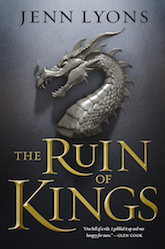

The Ruin of Kings
It takes a bit, but that bolt to the side finally takes Godfrey’s life, though he does manage to knight Balian and make him the new lord of Ibelin before dying. Indeed, by the time Balian the blacksmith-turned-baron gets to the Holy Land, everyone else in Godfrey’s group is dead, too (::pours one out for Vorenus::), except an awesome knight hospitaller (David Thewlis). Inexplicably, everyone Balian meets not only accepts his unsubstantiated claim to be Godfrey’s heir, but they also welcome him into the upper echelons of society. Stranger still, they pretty quickly start giving him important army posts—with not the slightest evidence that he’s qualified to do anything impressive besides somehow managing to sulk and smirk simultaneously.
Those military posts would be important at any point, but at the moment they’re a super big deal, since Jerusalem is enveloped in political infighting while an enormous Muslim army under the leadership of Saladin (Ghassan Massoud) is gathered at the border. The main players in Jerusalem are the leprous King Baldwin IV of Jerusalem (a masked Edward Norton), his marshall Tiberias (Jeremy Irons talking like Scar and sporting a literal scar), the king’s sister Sibylla (Eva Green), her husband Guy de Lusignan (Marton Csokas), and Guy’s blood-lusting ally Reynald of Châtillon (Brendan Gleeson).
Everyone has motivations. Balian wants to be a pure knight. Sibylla wants to look at Balian with a patented Eva Green wide-eyed-but-sultry stare. Reynald wants to kill Muslims. Guy wants to be king and to kill Muslims. Baldwin and Tiberias want to keep the peace and keep possession of Jerusalem. Saladin’s generals want to kill Christians, while Saladin wants to keep the peace but also have possession of Jerusalem. You can see there’s gonna be some tension. Especially when Balian starts having an affair with Sibylla because she’s in a loveless marriage and he’s very dreamy and she’s apparently into hairless chests.
As I said above, there’s a message in this film, and that’s Ridley Scott’s prerogative. Ain’t saying it’s right or wrong. Just wanting to point out that it very clearly overrides historical fact in all this.
What are the facts? Hang onto your red-crossed tabards …
Balian is based on a real guy: Balian of Ibelin. But he wasn’t a mourning bastard-son-of-Godfrey/blacksmith from France. Not even close. He was the noble son of Barisan, lord of Ibelin in the Holy Land (who himself is confusedly called Balian in some of our sources), and in the movie’s year of 1184 he was in truth around 41 years old, married to the widowed step-mother of King Baldwin and Sibylla, and for all his adult life had been deeply enmeshed in the politics of the kingdom of Jerusalem.
He was also unusually tall, strong, and, according to his contemporaries, really hairy. This means a big beard for sure, but almost assuredly pelt-like in overall body hair, as well. We’re talking semi-lupine here, people.
::looks at picture of non-muscular and chest-shaved Orlando Bloom again::
::curses::
Alas, you’ll not be surprised at all to hear that it is really super unlikely that the real Balian had an affair with Sibylla and that it looks like the filmmakers ginned up the affair and erased their family connections just to add some sexy stuff into all the slaughter.
A lot of the historical accuracy of the plot is this kind of thing: a seed of truth buried beneath a whole lot of fiction. From what evidence we have, Reynald really was crazier than an outhouse fly, for instance. But Guy de Lusignan was hardly his ally; they didn’t even like each other. And lord knows they wouldn’t have been dressed up as Knights Templar: they couldn’t have been in the brotherhood and still held title and inheritance. For that matter, the Templars weren’t the blood-thirsty killers the film imagines. To the contrary, they tended to focus on protecting Jerusalem by keeping the peace with the Muslims.
Speaking of keeping the peace, Baldwin and Tiberias were hardly the “Jerusalem belongs to everybody” progressives that the movie implies. For that matter, neither was Saladin, originally.
And Sibylla? Hoo-boy. She wasn’t with Guy against the longing of her heart. In fact, a condition of her becoming queen after the death of her brother and her young son (Baldwin V) was that she annul her marriage to Guy. She agreed to do this on the sole condition that she be allowed to choose whomever she wanted as a new husband once she was crowned. After her coronation, she freely chose Guy again…which is one of those really wild things in history that begs to have a movie made about it.
Alas, though, we’ve got Kingdom of Heaven instead.
I wanted to love this movie. I really did. I adore a lot of Ridley Scott’s work, and this movie is visually stunning in almost every way. Many of the sets are spectacular, and a lot of the battle tactics depicted are fabulous. The cavalry charges are astonishing, and the siege of Jerusalem does a great job revealing the scale of such an undertaking.
It bears repeating that the Director’s Cut is enormously superior to the original theatrical release in that it explains some of the most egregious aspects of Balian’s character arc. In the theatrical version there was essentially zero explanation for how blacksmith Balian knew anything about siege warfare, much less knew enough to lead the defense of Jerusalem against Saladin. The Director’s Cut at least offers some vague hand-waves at explaining that particular problem, though it still doesn’t explain why in the name of all that’s holy everyone around him automatically trusts him with everything that they find holy. And it also doesn’t do squat to explain how Balian also knows how to do all the other things he does, like leading a cavalry charge or finding water in a desert and then constructing a complex irrigation system to take advantage of it.
Given that last point, the film winds up being a bizarre mix of Western White Savior nonsense—the folks who’ve been surviving in the desert for generations don’t know how to find water here, but the newly arrived French blacksmith does—alongside a kind of anti-Western piece of propaganda. Yes, the film takes a few potshots at Islamic religious extremism, too, but it’s barely a drop in the bucket compared to the bloodied paintbrush with which it paints the other side. The crusaders weren’t angels, of course: the horrors committed by the Christian crusaders in the First Crusade reverberate in the memory of the Holy Land still today. Yet there were horrors committed by Islamic forces, too, and horrors upon horrors that each of those two sides committed upon members of their own faiths. In truth, no one can claim clean hands when it comes to the imperial urges of men.
Simply put, the Crusades demand a nuanced view of history. That Kingdom of Heaven fails to give us that—and that it presumably fails to do so because the filmmakers assumed nuance was beyond the reach of its audience—is easily the most disappointing thing in this disappointing movie. Because, in the end, that means that its failure is ours.
Mike’s Medieval Ratings
Authenticity: 1 out of 2 white-man wells in the desert
Just Plain Fun: 1 out of 2 Liam Neesons saying, “I once fought two days with an arrow through my testicle.”
 Michael Livingston is a Professor of Medieval Culture at The Citadel who has written extensively both on medieval history and on modern medievalism. His historical fantasy trilogy set in Ancient Rome, The Shards of Heaven, The Gates of Hell, and The Realms of God, is available from Tor Books.
Michael Livingston is a Professor of Medieval Culture at The Citadel who has written extensively both on medieval history and on modern medievalism. His historical fantasy trilogy set in Ancient Rome, The Shards of Heaven, The Gates of Hell, and The Realms of God, is available from Tor Books.










